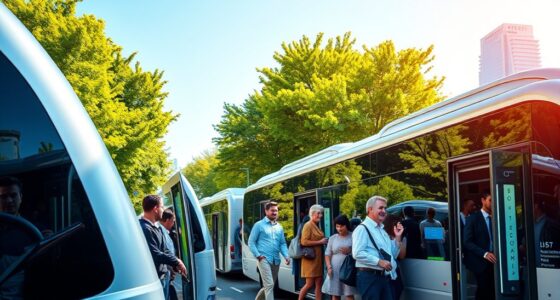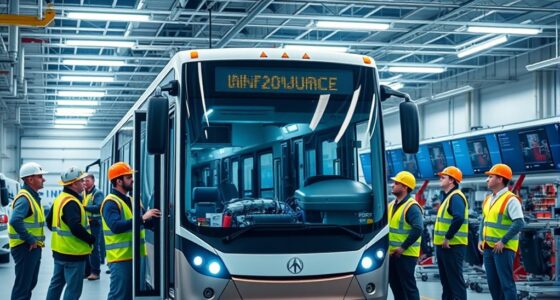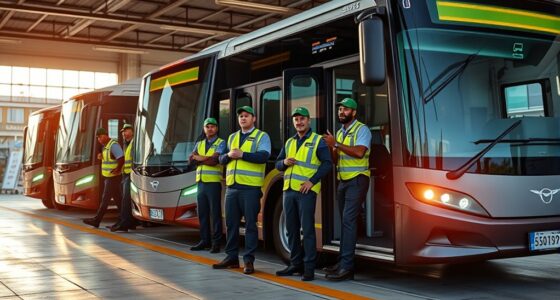Passenger feedback on electric bus rides is overwhelmingly positive. Many appreciate the quieter, fumes-free environment, making their daily commute more comfortable and less stressful. Riders also notice improved air quality and reduced noise levels, creating a more peaceful urban experience. The overall perception is that electric buses are cleaner, safer, and more reliable. If you want to discover more about how these rides are transforming cities, keep exploring the benefits they bring.
Key Takeaways
- Riders praise the significantly quieter and more peaceful ride compared to traditional diesel buses.
- Many passengers notice improved air quality and reduced fumes during their trips.
- Increased onboard sound satisfaction reflects a more comfortable and pleasant commuting experience.
- Riders appreciate the environmental benefits, feeling they contribute to cleaner urban air.
- The reliability and low-maintenance operation of electric buses enhance overall passenger satisfaction.

Electric buses are transforming urban transit by delivering a quieter, cleaner, and more comfortable experience for passengers. When you ride an electric bus, you notice a significant reduction in noise compared to traditional diesel models, with 94% of riders giving positive feedback on this improvement. This quieter environment makes your commute more peaceful, especially during busy hours when ambient noise can be overwhelming.
Electric buses offer a quieter, more peaceful ride with 94% of riders praising reduced noise levels.
Over time, passengers have also reported a 7% increase in satisfaction related to onboard sound levels between 2018 and 2019, emphasizing how advancements in electric bus design directly enhance your riding experience. Both technical innovations and ongoing monitoring contribute to these improvements, ensuring a better ride for everyone. Additionally, continuous technological improvements help further reduce noise and emissions, making electric buses an increasingly preferred choice. These improvements are supported by industry trends, which highlight the growing adoption of electric transit solutions worldwide.
Most riders agree that electric buses improve urban environments, with 96% noting the positive impact of reduced emissions. This perception isn’t just about cleaner air but also about a broader sense of contributing to sustainable cities. Many passengers appreciate the innovative indoor bus stops enabled by zero-emission operations, which make waiting more comfortable and less polluted. Moreover, the reduction in greenhouse gases from electric buses contributes significantly to climate change mitigation efforts.
As a result, there’s a 10% annual growth in ridership on electric routes, driven by their environmental appeal and the desire to support eco-friendly transportation options.
Safety remains the top priority for riders, with 41.3% citing it as the most important factor when choosing a bus. While comfort and reliability are also highly valued, the noise reduction and emissions-free operation play critical roles in shaping your overall satisfaction.
You’re more likely to select routes with electric buses because they offer a cleaner, fumes-free environment, aligning with your social and environmental values. These factors influence your route choices, especially if you’re environmentally conscious or seeking a healthier urban setting.
Your perceptions of electric buses are also shaped by their environmental benefits. Most riders believe these buses contribute to improved air quality and reduced noise pollution, which enhances their quality of life in densely populated areas.
Many actively choose electric routes to support sustainability efforts, appreciating that fleet electrification is an innovative step toward healthier cities. The approval of indoor bus stops reflects this, as they capitalize on the emission-free benefits to create more pleasant waiting areas.
Operationally, electric buses outperform diesel counterparts with 3.8 times higher fuel economy and 2.6 times better efficiency than diesel trolley buses on shared routes. They also require less maintenance, which helps ensure consistent service and reliability. Moreover, the integration of ethical hacking practices in system security ensures that transit infrastructure remains protected from cyber threats, safeguarding passenger data and service continuity. The steady growth in ridership indicates that passengers trust these vehicles and recognize their advantages. Additionally, energy cost savings contribute indirectly to your experience, making transit more affordable and accessible.
Frequently Asked Questions
How Do Electric Buses Compare Cost-Wise to Diesel Buses?
You might think electric buses cost more upfront, and they do—sometimes by about 50%. But, over time, they save you money through lower fuel and maintenance costs.
With estimates showing savings of over $100,000 in a bus’s lifetime. Their reduced emissions and energy efficiency make them a smarter, more sustainable choice.
Ultimately, they are more cost-effective than diesel buses in the long run.
What Are the Maintenance Differences Between Electric and Traditional Buses?
You’ll notice electric buses need less maintenance than traditional diesel ones. They’ve fewer moving parts, no oil changes, and less fluid to monitor.
Regular battery checks and software updates keep them running smoothly. Plus, diagnostics are simpler, and there’s less need for spare parts.
Safety features and training are essential, but overall, electric buses reduce your maintenance efforts and costs, making them more efficient and eco-friendly over time.
How Do Electric Buses Perform in Extreme Weather Conditions?
You wonder how electric buses handle extreme weather, and the answer’s quite intriguing. In cold conditions, they offer better stability and traction thanks to balanced weight.
But their range drops markedly, sometimes by a third, due to heating needs. Yet, advancements in battery tech and insulation are improving performance.
With proper planning and infrastructure, electric buses can operate effectively, even in harsh climates—though they still face challenges that need ongoing attention.
What Is the Typical Lifespan of an Electric Bus?
You’re probably wondering about the typical lifespan of an electric bus. Generally, these buses last around 12 to 15 years, similar to diesel models. Their longevity depends on factors like battery quality, maintenance, and operating conditions.
Proper care and advanced technology can extend their lifespan, making them a reliable, long-term transportation solution. Keep in mind, continuous improvements in battery life and maintenance practices help maximize their operational years.
Are There Any Safety Concerns Unique to Electric Bus Passengers?
You might wonder if electric bus passengers face unique safety concerns. While electric buses are built with advanced safety features, some worry about battery fires or electrical hazards. Rest assured, these risks are mitigated through protective casings, cooling systems, and strict safety standards.
Continuous maintenance and driver training also ensure safety. Overall, electric buses are designed to be as safe as traditional buses, providing a secure ride for passengers.
Conclusion
Your feedback reveals that riding electric buses feels like soaring on a cloud of innovation, transforming every journey into an extraordinary experience. It’s as if you’re gliding through a future where noise, pollution, and fatigue vanish into thin air. With each ride, you’re not just commuting—you’re unleashing a revolution that promises to redefine transportation itself. So, keep sharing your thoughts, because together, we’re propelling this electric wave toward a cleaner, brighter, and more exhilarating tomorrow.









